Abstract
Roquinimex (Roq) is an immunomodulator known to stimulate cellular immune responses. It is currently used for immunotherapy after bone marrow transplantation (BMT). One of the major features of this compound is an enhancement of natural killer (NK) cell activity and numbers. We studied the in vitro effect of Roq on human peripheral blood NK and adherent lymphokine-activated killer cell (ALAK) activities. In cultures supplemented with recombinant interleukin 2 (rIL-2) (1000 U ml-1) and Roq a significant increase in NK and LAK function was observed without a parallel increase in cell numbers. We also examined the generation of NK cells from human bone marrow (BM) immature progenitors, obtained by purging with 4-hydroperoxycyclophosphamide (4HC). NK cell numbers and activity were both increased when cultures with rIL-2 (10 U ml-1) were supplemented with Roq. These results confirm findings obtained in vivo and in vitro in the murine system and suggest that Roq is an active agent on these lymphoid populations. These properties and good tolerability make Roq an attractive tool for immunotherapy.
Full text
PDF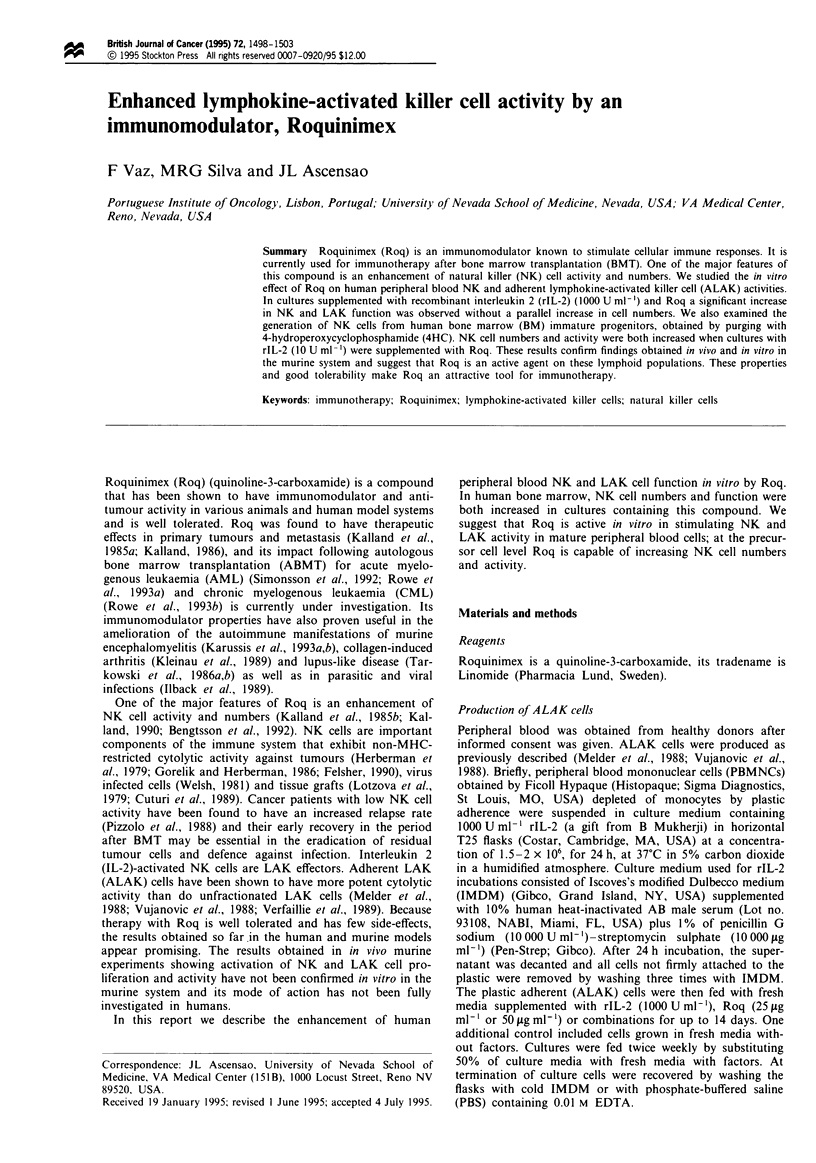
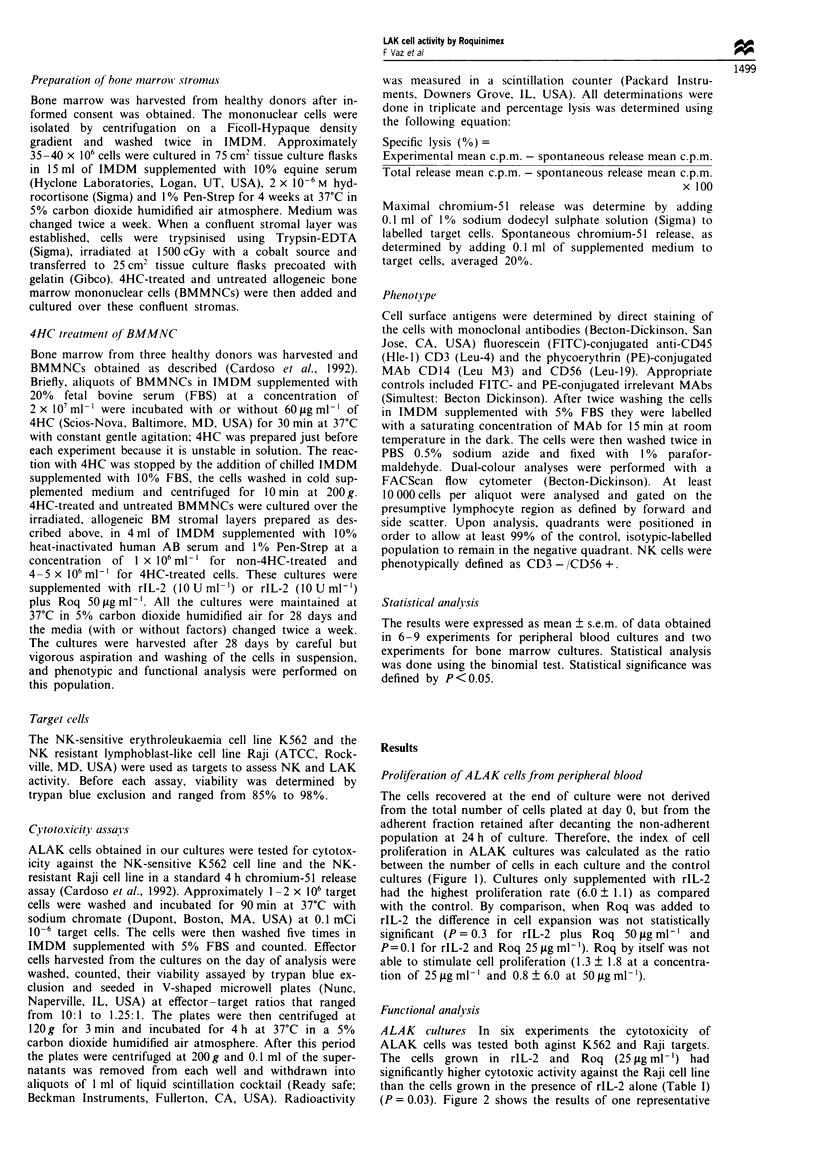
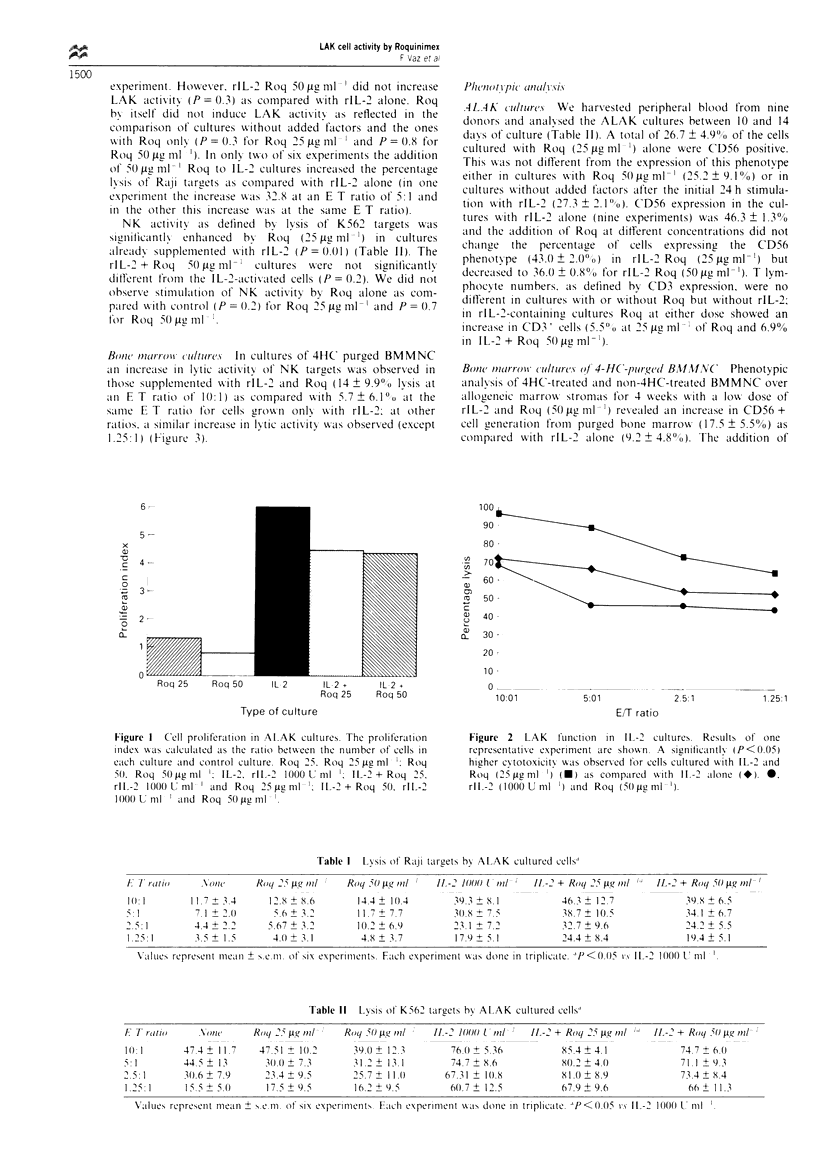
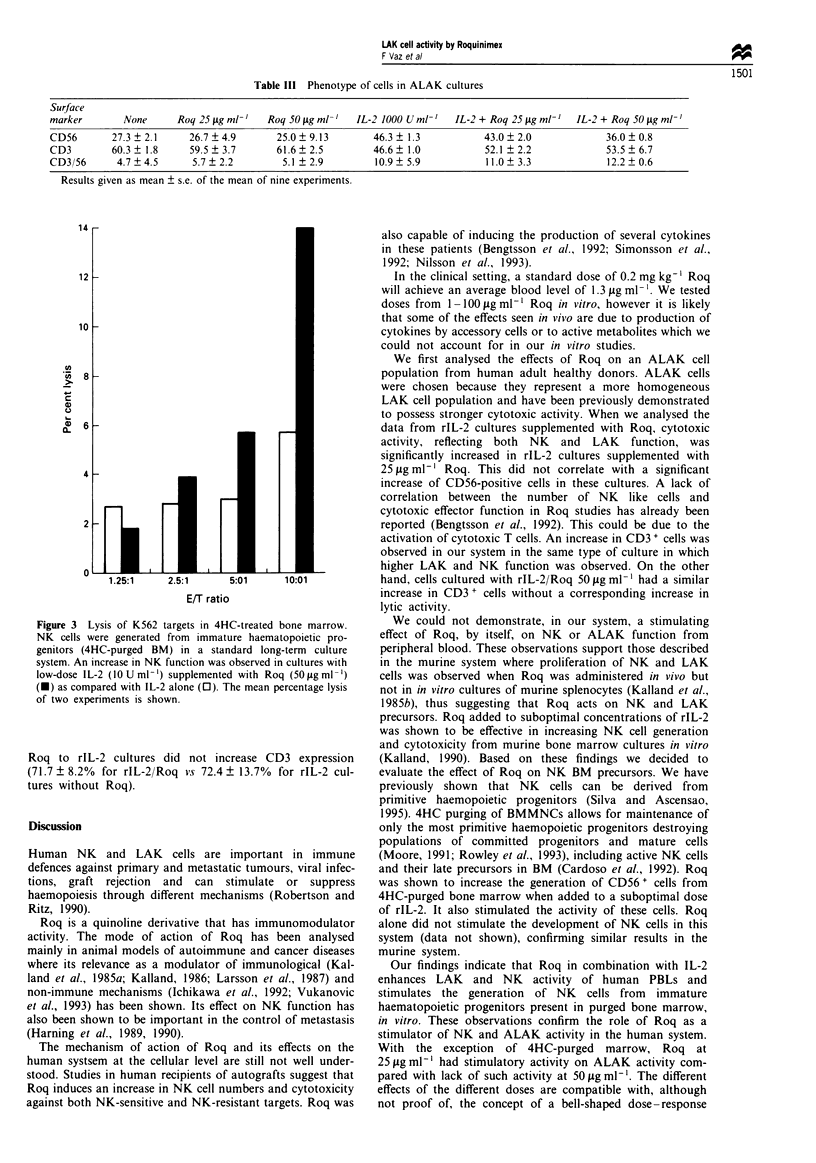
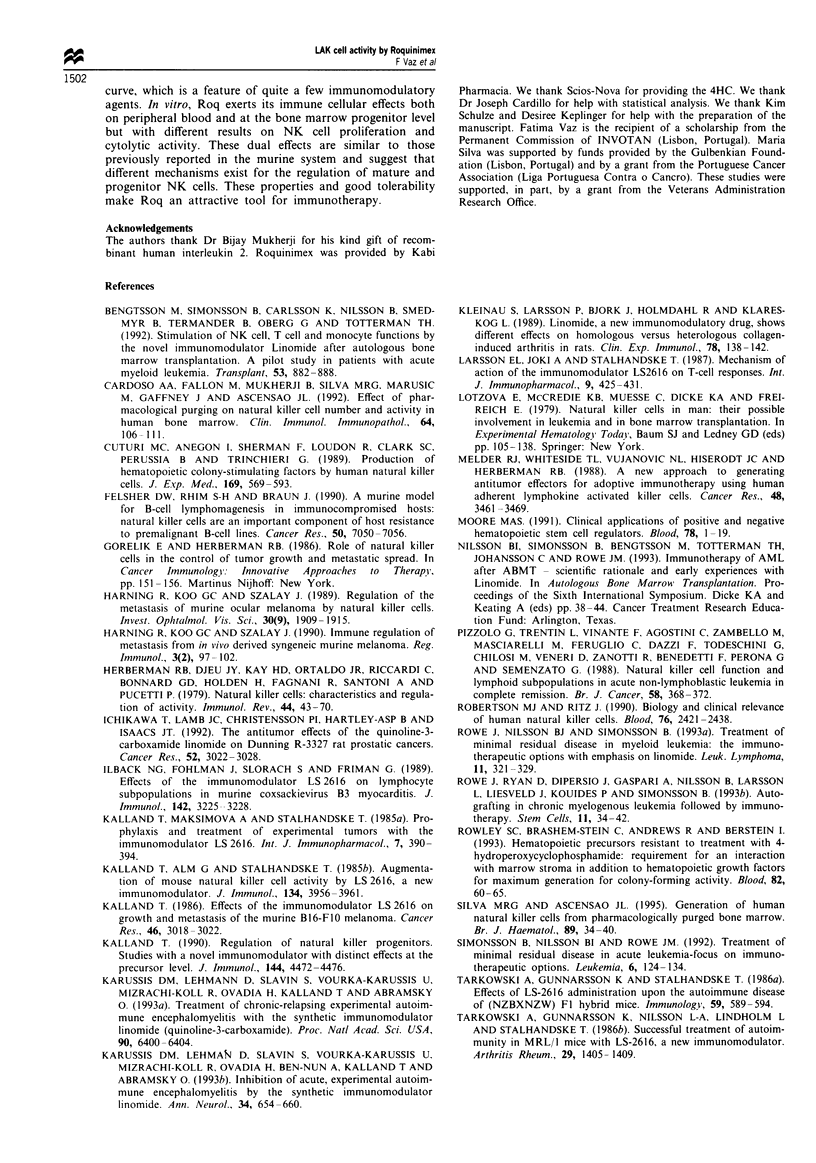
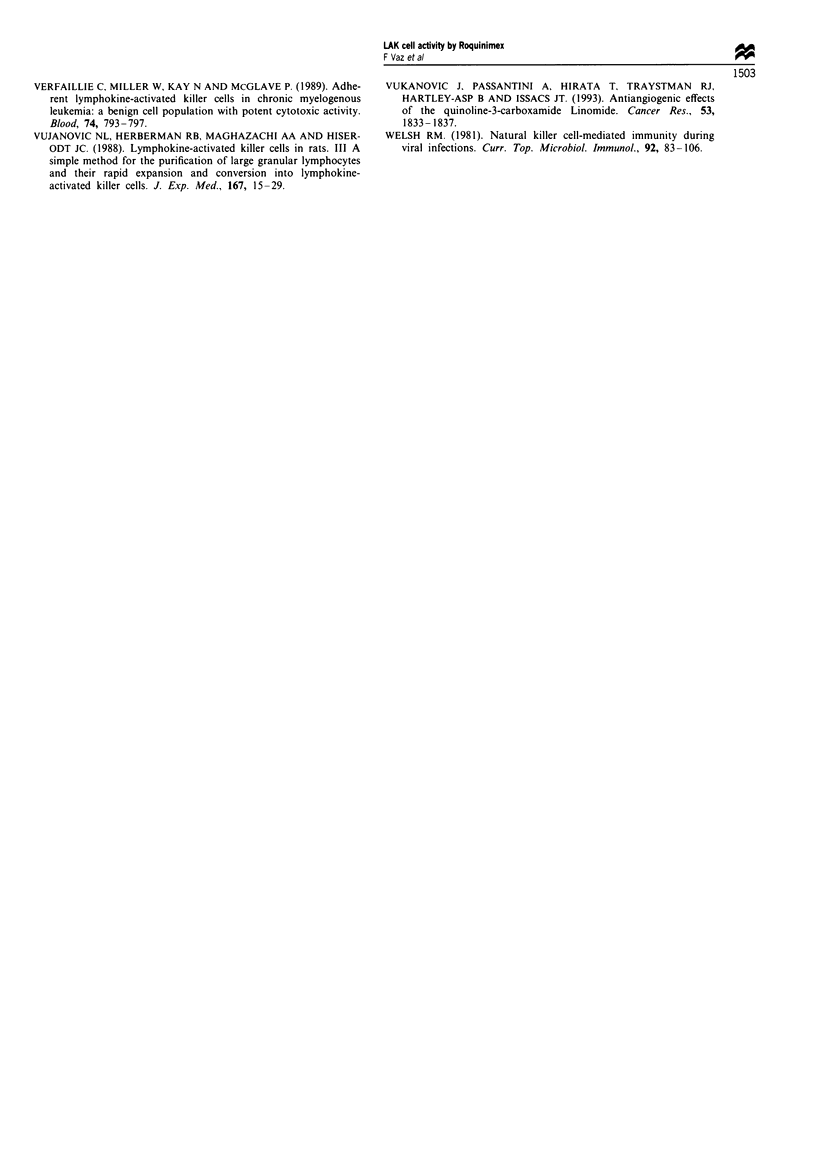
Selected References
These references are in PubMed. This may not be the complete list of references from this article.
- Bengtsson M., Simonsson B., Carlsson K., Nilsson B., Smedmyr B., Termander B., Oberg G., Tötterman T. H. Stimulation of NK cell, T cell, and monocyte functions by the novel immunomodulator Linomide after autologous bone marrow transplantation. A pilot study in patients with acute myeloid leukemia. Transplantation. 1992 Apr;53(4):882–888. doi: 10.1097/00007890-199204000-00032. [DOI] [PubMed] [Google Scholar]
- Cardoso A. A., Fallon M., Mukherji B., Silva M. R., Marusic M., Gaffney J., Ascensao J. L. Effect of pharmacological purging on natural killer cell number and activity in human bone marrow. Clin Immunol Immunopathol. 1992 Aug;64(2):106–111. doi: 10.1016/0090-1229(92)90187-s. [DOI] [PubMed] [Google Scholar]
- Cuturi M. C., Anegón I., Sherman F., Loudon R., Clark S. C., Perussia B., Trinchieri G. Production of hematopoietic colony-stimulating factors by human natural killer cells. J Exp Med. 1989 Feb 1;169(2):569–583. doi: 10.1084/jem.169.2.569. [DOI] [PMC free article] [PubMed] [Google Scholar]
- Felsher D. W., Rhim S. H., Braun J. A murine model for B-cell lymphomagenesis in immunocompromised hosts: natural killer cells are an important component of host resistance to premalignant B-cell lines. Cancer Res. 1990 Nov 1;50(21):7050–7056. [PubMed] [Google Scholar]
- Harning R., Koo G. C., Szalay J. Immune regulation of metastasis from in vivo derived syngeneic murine melanoma. Reg Immunol. 1990 Mar-Apr;3(2):97–102. [PubMed] [Google Scholar]
- Harning R., Koo G. C., Szalay J. Regulation of the metastasis of murine ocular melanoma by natural killer cells. Invest Ophthalmol Vis Sci. 1989 Sep;30(9):1909–1915. [PubMed] [Google Scholar]
- Herberman R. B., Djeu J., Kay H. D., Ortaldo J. R., Riccardi C., Bonnard G. D., Holden H. T., Fagnani R., Santoni A., Puccetti P. Natural killer cells: characteristics and regulation of activity. Immunol Rev. 1979;44:43–70. doi: 10.1111/j.1600-065x.1979.tb00267.x. [DOI] [PubMed] [Google Scholar]
- Ichikawa T., Lamb J. C., Christensson P. I., Hartley-Asp B., Isaacs J. T. The antitumor effects of the quinoline-3-carboxamide linomide on Dunning R-3327 rat prostatic cancers. Cancer Res. 1992 Jun 1;52(11):3022–3028. [PubMed] [Google Scholar]
- Ilbäck N. G., Fohlman J., Slorach S., Friman G. Effects of the immunomodulator LS 2616 on lymphocyte subpopulations in murine Coxsackievirus B3 myocarditis. J Immunol. 1989 May 1;142(9):3225–3228. [PubMed] [Google Scholar]
- Kalland T., Alm G., Stålhandshe T. Augmentation of mouse natural killer cell activity by LS 2616, a new immunomodulator. J Immunol. 1985 Jun;134(6):3956–3961. [PubMed] [Google Scholar]
- Kalland T. Effects of the immunomodulator LS 2616 on growth and metastasis of the murine B16-F10 melanoma. Cancer Res. 1986 Jun;46(6):3018–3022. [PubMed] [Google Scholar]
- Kalland T. Regulation of natural killer progenitors. Studies with a novel immunomodulator with distinct effects at the precursor level. J Immunol. 1990 Jun 1;144(11):4472–4476. [PubMed] [Google Scholar]
- Karussis D. M., Lehmann D., Slavin S., Vourka-Karussis U., Mizrachi-Koll R., Ovadia H., Ben-Nun A., Kalland T., Abramsky O. Inhibition of acute, experimental autoimmune encephalomyelitis by the synthetic immunomodulator linomide. Ann Neurol. 1993 Nov;34(5):654–660. doi: 10.1002/ana.410340506. [DOI] [PubMed] [Google Scholar]
- Karussis D. M., Lehmann D., Slavin S., Vourka-Karussis U., Mizrachi-Koll R., Ovadia H., Kalland T., Abramsky O. Treatment of chronic-relapsing experimental autoimmune encephalomyelitis with the synthetic immunomodulator linomide (quinoline-3-carboxamide). Proc Natl Acad Sci U S A. 1993 Jul 15;90(14):6400–6404. doi: 10.1073/pnas.90.14.6400. [DOI] [PMC free article] [PubMed] [Google Scholar]
- Kleinau S., Larsson P., Björk J., Holmdahl R., Klareskog L. Linomide, a new immunomodulatory drug, shows different effects on homologous versus heterologous collagen-induced arthritis in rats. Clin Exp Immunol. 1989 Oct;78(1):138–142. [PMC free article] [PubMed] [Google Scholar]
- Kulinskii V. I., Kostiukovskaia L. S. Opredelenie serotonina v tsel'noi krovi cheloveka i laboratornykh zhivotnykh. Lab Delo. 1969;7:390–394. [PubMed] [Google Scholar]
- Larsson E. L., Joki A., Stålhandske T. Mechanism of action of the new immunomodulator LS2616 on T cell responses. Int J Immunopharmacol. 1987;9(4):425–431. doi: 10.1016/0192-0561(87)90016-6. [DOI] [PubMed] [Google Scholar]
- Melder R. J., Whiteside T. L., Vujanovic N. L., Hiserodt J. C., Herberman R. B. A new approach to generating antitumor effectors for adoptive immunotherapy using human adherent lymphokine-activated killer cells. Cancer Res. 1988 Jun 15;48(12):3461–3469. [PubMed] [Google Scholar]
- Moore M. A. Review: Stratton Lecture 1990. Clinical implications of positive and negative hematopoietic stem cell regulators. Blood. 1991 Jul 1;78(1):1–19. [PubMed] [Google Scholar]
- Pizzolo G., Trentin L., Vinante F., Agostini C., Zambello R., Masciarelli M., Feruglio C., Dazzi F., Todeschini G., Chilosi M. Natural killer cell function and lymphoid subpopulations in acute non-lymphoblastic leukaemia in complete remission. Br J Cancer. 1988 Sep;58(3):368–372. doi: 10.1038/bjc.1988.221. [DOI] [PMC free article] [PubMed] [Google Scholar]
- Robertson M. J., Ritz J. Biology and clinical relevance of human natural killer cells. Blood. 1990 Dec 15;76(12):2421–2438. [PubMed] [Google Scholar]
- Rowe J. M., Nilsson B. I., Simonsson B. Treatment of minimal residual disease in myeloid leukemia--the immunotherapeutic options with emphasis on Linomide. Leuk Lymphoma. 1993 Nov;11(5-6):321–329. doi: 10.3109/10428199309067922. [DOI] [PubMed] [Google Scholar]
- Rowe J., Ryan D., Dipersio J., Gaspari A., Nilsson B., Larsson L., Liesveld J., Kouides P., Simonsson B. Autografting in chronic myelogenous leukemia followed by immunotherapy. Stem Cells. 1993 Oct;11 (Suppl 3):34–42. doi: 10.1002/stem.5530110911. [DOI] [PubMed] [Google Scholar]
- Rowley S. D., Brashem-Stein C., Andrews R., Bernstein I. D. Hematopoietic precursors resistant to treatment with 4-hydroperoxycyclophosphamide: requirement for an interaction with marrow stroma in addition to hematopoietic growth factors for maximal generation of colony-forming activity. Blood. 1993 Jul 1;82(1):60–65. [PubMed] [Google Scholar]
- Silva M. R., Ascensao J. L. Generation of human natural killer cells from pharmacologically purged bone marrow. Br J Haematol. 1995 Jan;89(1):34–40. doi: 10.1111/j.1365-2141.1995.tb08914.x. [DOI] [PubMed] [Google Scholar]
- Simonsson B., Nilsson B. I., Rowe J. M. Treatment of minimal residual disease in acute leukemia--focus on immunotherapeutic options. Leukemia. 1992 Nov;6 (Suppl 4):124–134. [PubMed] [Google Scholar]
- Tarkowski A., Gunnarsson K., Nilsson L. A., Lindholm L., Stålhandske T. Successful treatment of autoimmunity in MRL/1 mice with LS-2616, a new immunomodulator. Arthritis Rheum. 1986 Nov;29(11):1405–1409. doi: 10.1002/art.1780291115. [DOI] [PubMed] [Google Scholar]
- Tarkowski A., Gunnarsson K., Stålhandske T. Effects of LS-2616 administration upon the autoimmune disease of (NZB x NZW) F1 hybrid mice. Immunology. 1986 Dec;59(4):589–594. [PMC free article] [PubMed] [Google Scholar]
- Verfaillie C., Miller W., Kay N., McGlave P. Adherent lymphokine-activated killer cells in chronic myelogenous leukemia: a benign cell population with potent cytotoxic activity. Blood. 1989 Aug 1;74(2):793–797. [PubMed] [Google Scholar]
- Vujanovic N. L., Herberman R. B., Maghazachi A. A., Hiserodt J. C. Lymphokine-activated killer cells in rats. III. A simple method for the purification of large granular lymphocytes and their rapid expansion and conversion into lymphokine-activated killer cells. J Exp Med. 1988 Jan 1;167(1):15–29. doi: 10.1084/jem.167.1.15. [DOI] [PMC free article] [PubMed] [Google Scholar]
- Vukanovic J., Passaniti A., Hirata T., Traystman R. J., Hartley-Asp B., Isaacs J. T. Antiangiogenic effects of the quinoline-3-carboxamide linomide. Cancer Res. 1993 Apr 15;53(8):1833–1837. [PubMed] [Google Scholar]
- Welsh R. M. Natural cell-mediated immunity during viral infections. Curr Top Microbiol Immunol. 1981;92:83–106. doi: 10.1007/978-3-642-68069-4_6. [DOI] [PubMed] [Google Scholar]


